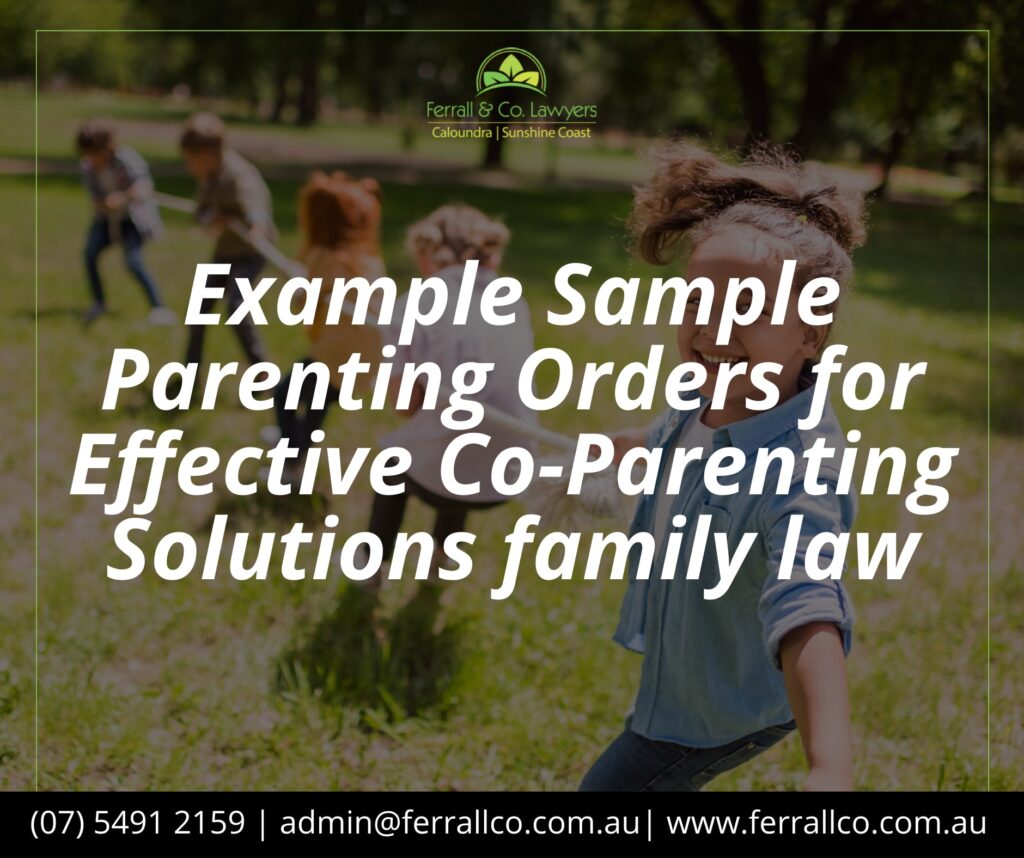
Securing the best interests of children during family law matters is one of the Family Court’s core priorities. Divorce is a difficult time for families, and co-parents want to protect their dependent during this time. One of the safest and most reliable ways of developing a positive co-parenting arrangement is through a sample parenting orders. Here’s an example of what a parenting arrangement may look like.
Sample parenting orders
Parties to the order
First parent: Jane Adams
Second parent: John Smith
The parties to this order are the legal guardians of the following minor child:
Emma Smith, born 11 August, 2018.
Living arrangements and parental responsibilities
(1) The parents agree that the first parent has primary care responsibilities for the child. The child will live with the first parent, except where otherwise specified in this order.
(2) Both parents will share the parental responsibility for making long-term decisions for the child. Joint decisions will cover significant matters concerning the dependent, including the child’s education, healthcare, religious and cultural instruction, and other issues related to the child’s welfare.
(3) The first parent will have responsibility for the day-to-day care and development of the child. This includes the following:
(a) The first parent will ensure that the child maintains extracurricular activities, including participation at their local tennis club and swimming lessons.
(b) The child’s access to digital devices for entertainment purposes will be restricted to no more than two hours per day.
(c) The first parent will not permit the child to download or otherwise access an app, game, or any other programme that has a rating higher than PG.
Need help with your divorce? Get a free 30-minute consultation from Ferrall & Co. Lawyers. Contact us for assistance.
Visitation
(4) The second parent will have visitation rights with the child. The conditions of the second parent’s visitation are as follows:
(a) The child will live with the second parent on alternating weekends from 11 am on Saturday to 5 pm on Sunday.
(b) The visitation arrangement will be suspended on the Mother’s Day weekend. On the Mother’s Day weekend, the second parent’s visitation will change from 11 am on Saturday to 11 am on Sunday.
(c) The visitation arrangement will be suspended during school holiday periods.
(d) During school holidays, the second parent’s visitation will extend from 11 am on Friday to 11 am on the following Monday.
(e) The “school holiday period” refers to the holiday periods after school terms 1, 2, and 3. The school holiday period is taken to begin at 5 pm on the final day of the term and ends at 5 pm on the day before school returns.
(f) The child will live with the second parent from 11 am on 2 January to 11 am on 16 January each year.
(g) On alternating years, the child will live with the second parent from 11 am on 25 December to 5 pm on 26 December, beginning in 2025.
(h) In intervening years, the second parent will have a one-hour video call with the child on Christmas Day. The time at which the call occurs will be settled by the parents no later than three days before Christmas Day.
(i)On alternating Easter weekends, regular visitation arrangements will be suspended. Beginning in 2026, the child will live with the second parent from 11 am on Saturday to 11 am on Sunday and with the first parent for the remainder of the Easter weekend.
(j) If the child’s birthday falls on a weekend, the regular visitation arrangements will apply. If the child’s birthday falls on a weekday, the second parent will have a fifteen-minute video call with the child starting at any time between 6 pm and 7 pm.
(k) The first parent will drop off the child at the second parent’s residence at the beginning of the second parent’s contact time. The first parent will pick the child up from the second parent’s residence at the end of the contact time.
(l) When the child is in the second parent’s care, the child will not be left under the sole supervision of anyone other than the second parent.

Contact with extended family
(5) Notification will be provided before the child has contact with any extended family, including grandparents, aunts, uncles, or cousins.
(6) All contact with extended family members will be supervised by one of the parents.
(7) Extended family members will be restricted from speaking negatively to the child about either parent.
Communication
(5) The parents have agreed to use the OurFamilyWizard co-parenting app to schedule visitation and track special events.
(6) The parents will use email for routine communication regarding the child.
(7) All communication between the parents will be respectful and focused on the child. The parents will avoid derogatory or threatening language.
(8) Neither parent will use the child to communicate.
(9) Each parent will only establish communication to discuss matters directly related to the care and welfare of the child.
(10) In the event of an emergency, the parent who has care of the child will notify the co-parent by mobile phone as soon as practicable.
(11) Neither parent will speak to the child about the co-parent’s occupation or relationship status.
(12) The second parent won’t purchase birthday or Christmas gifts for the child that exceed $100 in value.
(13) The parents will discuss gifts for the child prior to the child’s birthday and Christmas to avoid duplication.

Travel
(12) A parent must discuss interstate or international travel involving the child with the other parent by email.
(13) Notification of an intention to travel with the child must include all relevant information, including:
Departure and return dates.
Flight itinerary.
Destination address and updated contact information, if applicable.
Accommodation details.
(14) The child must not be taken to a country where there’s a current Australian travel warning in place.
(15) If the second parent intends to take the child overseas on an agreed-upon holiday, the first parent must provide the child’s passport no later than 48 hours before departure. The second parent will hand the child’s passport back to the first parent upon return.
Dispute resolution
(12) The parents will use email as the first point of contact to discuss disputes.
(13) For disputes that the parents cannot settle, a mediation service will be used. The parents will use a mutually agreed-upon dispute resolution service.
(14) Neither parent will communicate any grievances with the child.
(15) In the event that one parent cannot adhere to the agreed-upon schedule, that parent will give at least 24-hour notice to the other parent by email. If the parent cannot provide a 24-hour notice, they may contact the other parent by phone to discuss the situation.
Get Your Free Child Custody Guidebook
Navigate child custody with confidence using expert-backed advice. Understand your rights, responsibilities, and best strategies for a smooth process. Download your free guide today.
From our clients
Rowena's advice to me in my recent legal matter was concise, accurate and correct, it was also delivered in understandable English and not legalese. I have used several legal firms over the years, including some high profile legal practices, and Rowena was equal and better than them.
- Les Patton
It’s crucial to get reliable advice before entering any parenting agreement. The Ferrall and Co. team assists every client to achieve positive results in their unique circumstances. Our ability to convey accurate and concise advice produces fairer parenting arrangements regardless of your co-parenting situation. We ensure that the agreement fully encompasses all necessary details in the best interests of your child.
Conclusion
Parenting consent orders play a crucial part in the divorce process. They protect the best interests of children and establish productive co-parenting arrangements. Understanding the content and structure of a parenting agreement helps to clarify how a court order organises parenting issues. While this article only provides a sample parenting order, it can help guide you in how a court order may formalise your parenting matter.
Are you working through a co-parenting arrangement? Contact our office today and let our experienced team help.






